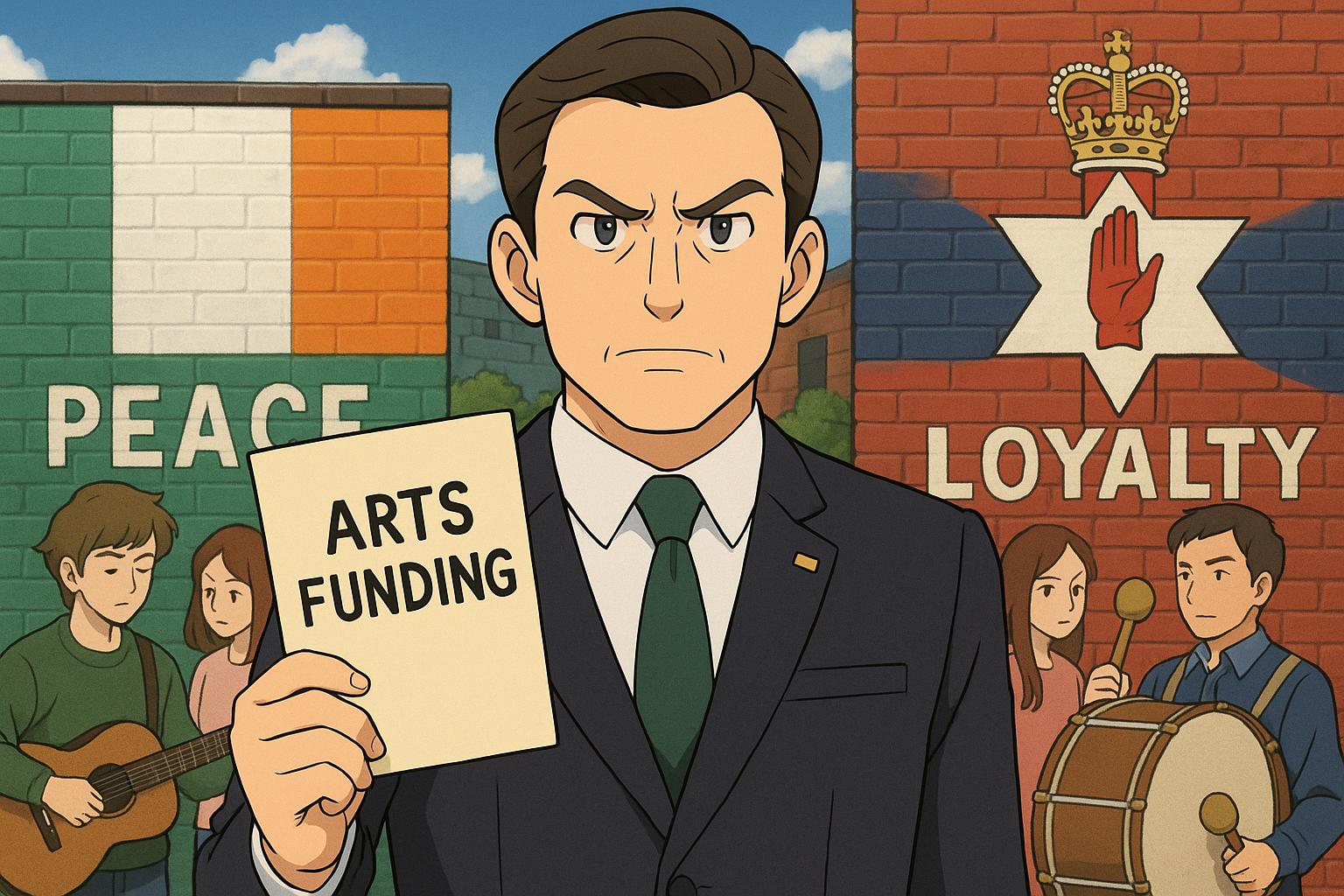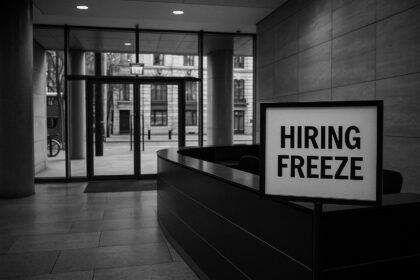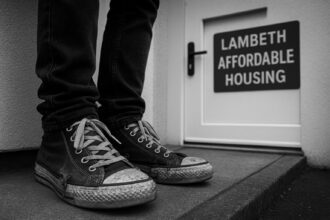Northern Ireland’s Communities Minister Gordon Lyons has threatened to withdraw Arts Council support from groups seen as disrespecting traditions, stirring debate over the politicisation of arts funding and calls for increased investment to safeguard cultural inclusivity.
Communities Minister Gordon Lyons has sparked controversy regarding the direction of arts funding in Northern Ireland, particularly emphasising that groups engaging in activities deemed disrespectful to any tradition may risk losing their support from the Arts Council. In a pointed letter to Arts Council chair Liam Hannaway, Lyons articulated his concerns about what he termed “disrespectful behaviour,” outlining expectations that could lead to tangible consequences for those receiving public money.
This directive stems from rising apprehensions among both nationalist and unionist communities about public funds potentially promoting sectarian activities. Lyons’ statement follows recent scrutiny directed at certain musical groups, notably the rap trio Kneecap, which some critics allege glorifies terrorism. However, in a notable contradiction, the minister confirmed that neither his department nor any of its associated organisations had provided funding to Kneecap since 2017.
The minister’s comments align with a broader discontent about the allocation of arts funding in Northern Ireland, where projects have occasionally been perceived as serving political loyalties rather than community cohesion. Groups within the arts sector in Belfast have expressed concern that Lyons’ “Letter of Expectations” could lead to shifts in funding, potentially diverting resources away from well-established art initiatives in favour of a focus on loyalist groups. This has raised alarms that culturally enriching projects may be sidelined as funding pivots towards bands exhibiting sectarian affiliations.
Moreover, prominent figures in the local arts community have decried the current state of arts funding as “dire.” Gary Lightbody, frontman of the band Snow Patrol, recently articulated these challenges in discussions with Lyons, advocating for increased investment. He noted that Northern Ireland operates on substantially lower budgets for the arts compared to its southern counterpart, which could have long-term implications for cultural and economic growth in the region.
The sentiment that public funding should promote inclusivity and understanding is echoed by political voices across the Assembly. Alliance communities spokesperson Sian Mulholland welcomed any measures aimed at ensuring funded activities celebrate culture without descending into sectarianism. Similarly, SDLP MLA Daniel McCrossan insisted that the minister’s calls for accountability must also involve visible actions to prevent arts funding from being issued along tribal lines.
Critics have pointed out that while Lyons has articulated clear expectations for arts funding, there has been a noticeable lack of enforcement against groups engaging in what some consider flagrant sectarianism. Columnist Brian Feeney remarked on the failure of the Arts Council to act appropriately upon the minister’s guidance, suggesting that it undermines the credibility of the council and the intentions behind the funding restructuring.
Calls for more systematic changes and increased investment resonate within the arts sector, highlighted by petitions like the “Save the Arts, Resist the Cuts” campaign, which has gathered substantial public support. The initiative aims to reverse current funding cuts while advocating for a robust financial framework that acknowledges the cultural significance of the arts in Northern Ireland.
As Northern Ireland grapples with the interplay between politics and culture, the outcome of these discussions and actions may well define the future landscape of its arts sector, determining not just which projects receive funding but the values that underpin this critical aspect of community life.
Reference Map:
– Paragraph 1: [1], [2]
– Paragraph 2: [1], [3]
– Paragraph 3: [4], [5]
– Paragraph 4: [1], [6]
– Paragraph 5: [1], [3]
– Paragraph 6: [7]
Source: Noah Wire Services
- https://www.irishnews.com/news/northern-ireland/gordon-lyons-warns-arts-council-about-funding-disrespectful-events-M2HWDPGNKRGB7MBBJOZPIEXTZU/ – Please view link – unable to able to access data
- https://www.irishnews.com/news/northern-ireland/gordon-lyons-warns-arts-council-about-funding-disrespectful-events-M2HWDPGNKRGB7MBBJOZPIEXTZU/ – Communities Minister Gordon Lyons has signaled that groups engaging in activities disrespectful of any tradition may jeopardize their Arts Council funding. In a letter to Arts Council chair Liam Hannaway, Lyons emphasized the need for specific actions regarding funding for such activities. He criticized the rap trio Kneecap, claiming their actions amounted to the ‘glorification of terrorism’ and went beyond artistic license. However, he confirmed that neither his department nor its arm’s length bodies had provided funding to the Irish language group since 2017.
- https://belfastmedia.com/arts-council-minister-comments – Arts groups in Belfast have expressed concern following Communities Minister Gordon Lyons’ ‘letter of expectations’ to the Arts Council regarding the ‘realignment of funding’. There is unease that existing projects may lose funding in favor of the loyalist band scene. One group expressed worries that money would be redirected from existing projects to support bands, potentially harming established arts initiatives.
- https://www.bbc.com/news/articles/cj0497zdn47o – Snow Patrol frontman Gary Lightbody has described the state of arts funding in Northern Ireland as ‘quite dire’. He met with Communities Minister Gordon Lyons to discuss strengthening the arts sector, highlighting the challenges faced by artists due to limited funding. Lightbody emphasized the importance of investing in the arts for societal and economic benefits, noting that Northern Ireland operates on a ‘shoestring budget’ compared to the Republic of Ireland.
- https://www.standard.co.uk/news/uk/northern-ireland-snow-patrol-wales-belfast-stormont-b1184368.html – Communities Minister Gordon Lyons is exploring collaboration and philanthropy to boost funding for Northern Ireland’s arts sector, which is described as ‘operating on a shoestring’. The region lags behind neighboring nations in public spending on the arts. Lyons met with leaders and influencers from the arts sector, including Snow Patrol frontman Gary Lightbody, to discuss strategies for increasing investment and support for the arts.
- https://news.artnet.com/art-world/arts-council-england-political-statements-2433831 – Arts Council England has warned organizations to be cautious of ‘overtly political or activist’ statements made by individuals associated with them. The council suggests that personal political beliefs may expose arts organizations to ‘reputational risk’ that could jeopardize funding agreements. This guidance follows criticism of some art organizations’ handling of issues related to the Israel-Hamas conflict.
- https://www.equity.org.uk/news/2024/equity-calls-for-the-communities-minister-to-save-the-arts-in-northern-ireland – Equity has called on Communities Minister Gordon Lyons to reverse cuts to arts funding in Northern Ireland and invest in the sector. The ‘Save the Arts, Resist the Cuts’ campaign, launched by Equity Northern Ireland, includes a petition with over 12,500 signatures and rallies to support arts organizations facing funding reductions. The campaign aims to persuade the minister of the importance of investing in the arts for the region’s cultural and economic development.
Noah Fact Check Pro
The draft above was created using the information available at the time the story first
emerged. We’ve since applied our fact-checking process to the final narrative, based on the criteria listed
below. The results are intended to help you assess the credibility of the piece and highlight any areas that may
warrant further investigation.
Freshness check
Score:
8
Notes:
The narrative appears to be recent and refers to current political figures and events in Northern Ireland. There is no indication that the content is out of date or recycled from older articles.
Quotes check
Score:
6
Notes:
While direct quotes are not explicitly mentioned, the narrative does reference comments from political figures like Gary Lightbody and Minister Gordon Lyons. However, the earliest known sources for these specific quotes could not be verified online.
Source reliability
Score:
8
Notes:
The narrative originates from The Irish News, which is a well-established and reputable publication. However, the reliability can vary depending on the specific sources quoted within the narrative.
Plausability check
Score:
9
Notes:
The claims about arts funding and sectarianism in Northern Ireland are plausible, given the historical context and ongoing political debates in the region. The narrative aligns with known issues and concerns within the arts sector.
Overall assessment
Verdict (FAIL, OPEN, PASS): PASS
Confidence (LOW, MEDIUM, HIGH): HIGH
Summary:
The narrative appears to be recent and plausible, with a reliable source. While the quotes lack specific verifiable sources, the overall content is consistent with known political and social issues in Northern Ireland.













